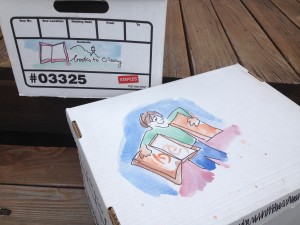
Getting ready for lookout life means making boxes of books and canned soup. Artwork and images by the author
“I often conduct an orchestra in my sleep; my orchestras are so huge that the back desks of the violas vanish into the horizon. And everything is so wonderful,” wrote Finnish composer Jean Sibelius to a colleague in 1943.
I had to call my violin-playing sister in Connecticut to ask her about the “back desks of the violas.”
“Oh,” she said from her desk at the town office in West Cornwall. “Desk is another way to say stand.” Ah, I thought. Not the back of the actual instrument, but the pair of two musicians with a music stand. The back desks would be the back of the section where there are no other strings behind the players. So Sibelius in his sleep conducted an orchestra so vast there are instruments swaying to the music as far as he can see.
I love imagining that, and I can almost hear a sea of sound tenderly humming through the plaintive strains of “The Swan of Tuonela.” There used to be a time when a Flagstaff gal could call KNAU and request specific pieces to play on the air; Duart Martin would pull Sibelius from the library and soon I’d feel familiar themes meet my brooding as I stood on the cat walk at the fire lookout. And yes, with binoculars in Buffalo Park, you might have looked up at Mt. Elden on a fall day and spied me waving my arms to conduct the more stirring passages.
But if I conducted in my sleep like a Finnish composer, I think, there would be a row of basses that turn into thunderclouds on the horizon. The piccolos might be quail gurgling through the underbrush. The violas mimic water sliding over granite rocks in a desert canyon. That sweeping swoosh of wind in pine needles is the second violin section trading harmony with the woodwinds. Surely it must be magic to hold a baton above waves of sound.
Oh, but wait. I don’t have to dream to know that.
I actually conducted an orchestra this winter.
Yes, it’s true. As my forest service colleagues and I reconvene to staff mountain top fire lookouts, dirt road patrolling trucks, and fire gulping engines, we will trade stories of winter hikes, canyon raft trips and foreign exploits, and I can add to the adventures my tale of stepping up to the podium at the spring concert of the Torrington Symphony.
In March I went to northwest Connecticut to help my sister and her husband make maple syrup. We washed 100 pails and took a drill and metal taps to stout maples beside the stone walls and drank wine in the evening while we shouted answers at the TV to questions on Jeopardy. And we waited for the cusp of spring to bring freezing nights paired to warm days which causes sweet sap to rise out of roots and up the trunks of maple trees. Ping … ping … ping was the sound we wanted: the dripping that becomes pails of sap to be collected and then simmered for hours, which eventually becomes quart jars of syrup so tasty you feel like you are savoring the ambrosia of a very long kiss from a particularly tender and ancient landscape.
Ever hungry for culture, I took a day off from sap collecting for the two hour train ride into New York City where in 24 hours I mused through tapestries at the Frick, and marveled inside the great sprawling galleries at the Metropolitan Museum of Art, and caught my favorite opera, “Tales of Hoffmann” at the Met and, oh yes, ate twice at the Oyster Bar in Grand Central Station.
That plunge into big city culture was sweet to relive as I put on Bean boots to meet mud season on the farm. Move firewood, collect eggs, go for a dusk walk along the Housatonic River and note the ice beginning to go soft at the edges. Await the movement of sugar inside the trees. And oh, it’s Saturday night, time to hear my sister play her violin in the cabaret pops concert of the Torrington Symphony. And then, at the intermission raffle there are happy winners collecting bouquets and syrup and wine, but when the grand prize—the chance to conduct the orchestra—is announced, no one claims the winning ticket. “Actually,” the lady at the next table admits, “I’d rather not.”
“I’ll do it,” I said. And before you can say “Leroy Anderson’s ‘Governor Bradford March’,” maestro Steinberg is handing me his baton and the musicians are settling in, including my twin in the second stand of first violins who looks as surprised as I’ve ever seen her to find me on the podium. I’m hoping they all know to keep playing no matter what. While I played in grade school orchestra myself, and I can read music, there is a sea of notes on the book of parts below my nose and I realize there is no chance I’ll be flipping pages correctly. But I do think to greet the principal violinist, which feels polite. And I admit to the first stand on my right that I have played cello myself, which was a good thing to do because then a kind cellist helps me out as we approach the end of the piece, and I realize maybe it would be nice if conductor and orchestra ended at the same time. “Give me a warning,” I ask him, and he nods at me in time to make a showy 1, 2, 3 ta da! Cue audience applause and orchestral grinning all around.
It’s late spring and like sap rising in trees, my thoughts and memories of winter adventuring rise through the chores of gathering the cans of food and boxes of books to tote up to the fire lookout soon. I hear again the pinging of sap in buckets, the swell of operatic voices twining through an aria at the Met, and the thrumming through my bones of violins, cellos and basses, trombones, flutes and bass drum from musicians leaning toward my baton in the air, all moving collected sound through my days. And Sibelius is right, “… everything is so wonderful.”
A native of Arizona, Jean Rukkila is a fire lookout and writer who has taught journal-keeping as a visiting artist in schools around the state and in writing classes at Coconino Community College. See more of her writing at www.flagstaffletterfromhome.com.

